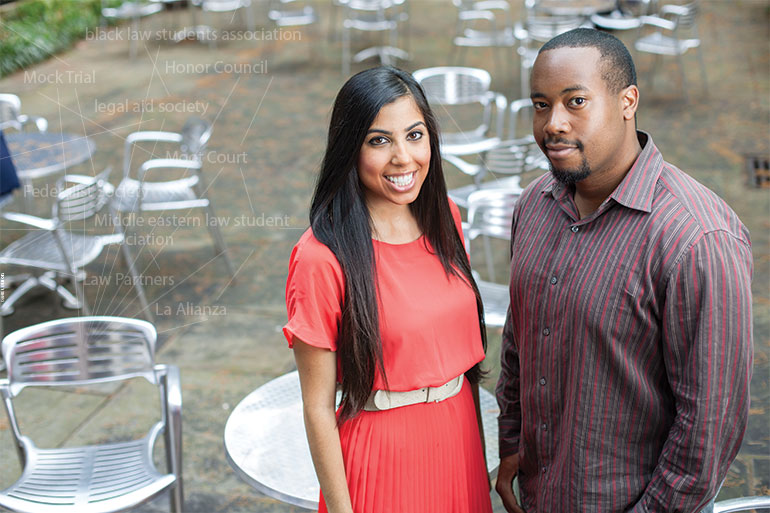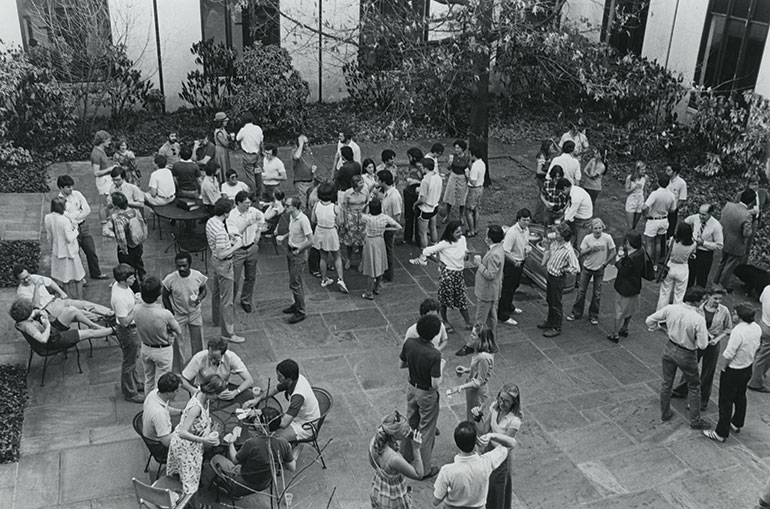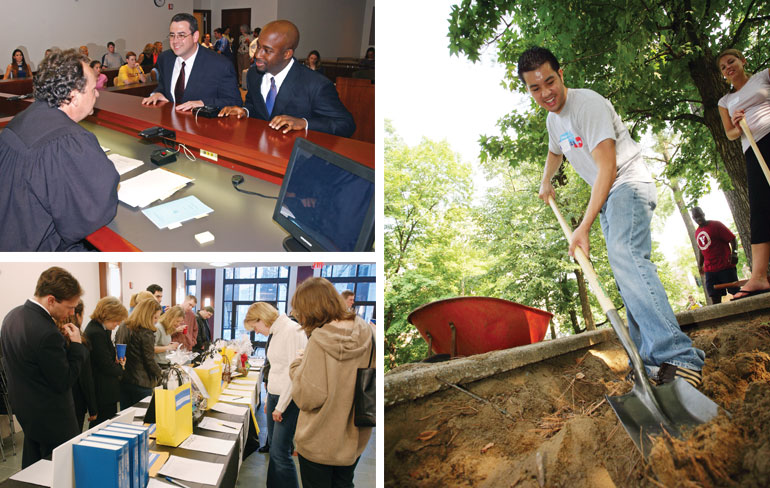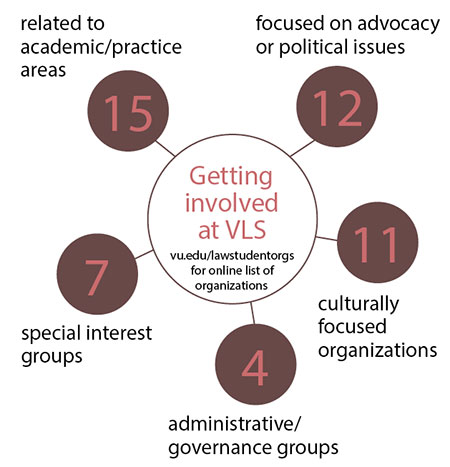Student organizations support students while helping them hone their legal skills.

Attending the Legal Aid Auction as part of an Admitted Students Program was instrumental in Emily Wurtenberger’s decision to join Vanderbilt Law School’s Class of 2014. As a student at the University of Notre Dame, where she earned her undergraduate degree, Wurtenberger had volunteered regularly at a South Bend homeless shelter. The auction confirmed her impression that Vanderbilt’s community feel was genuine.
“I really liked that students here are willing to donate their time outside of the law school daily grind,” she said. “I had tons of fun at the auction, and I knew coming in that I’d want to be involved in Legal Aid.” This year, as the Legal Aid Society’s fundraising chair, Wurtenberger helped organize a successful auction she hopes made a positive impression on incoming members of the Class of 2016.
Wurtenberger’s experience isn’t unique. According to Assistant Dean for Student Affairs Julie Sandine, Vanderbilt’s broad array of student organizations not only help attract students to Vanderbilt, they also contribute significantly to their quality of life throughout law school.
An attorney who taught legal writing at Vanderbilt before joining its staff, Sandine knows firsthand that the academic demands of law school can seem especially daunting and isolating to first-year students. She believes connecting with other students through involvement in professional, social and volunteer organizations can help students make a healthy adjustment to law school’s rigors and routines. “Studies show that people need to feel autonomy and a sense of relatedness to other people to have personal and professional fulfillment,” she said. “Those aren’t feelings typically associated with law school, especially the first year. I think our array of vibrant and interesting student organizations help our students meet those needs and foster a pervasive collegial atmosphere. People are often surprised when I tell them our students are so fulfilled by their experience here that the prospect of graduation is rather bittersweet.”
In the 11 years Sandine has headed Vanderbilt’s Office of Student Affairs, she’s seen steady growth in the number of student organizations as well as the strengthening of two stalwarts—the Women Law Students Association and the Black Law Student Association, both of which date back to the days when women and African American students were fewer in number. This year, students were able to choose from 49 different organizations.

When students enroll in Vanderbilt Law School, they all become members of the Vanderbilt Bar Association. The VBA manages the law school’s fluctuating number of student organizations, which range from professional interest to social justice to just plain social. In any given week, students may choose among several lunchtime lectures and panel discussions as well as social meetings aimed at helping even 1L students feel grounded and balanced. Student organizations also sponsor social gatherings affectionately known as Blackacres, often themed according to the organization’s mission, on Friday nights throughout the school year.
“Our student organizations are sort of the central nervous system of the unique student culture at Vanderbilt Law School,” said Student Affairs Program Coordinator Chris Meyers, who works closely with student organizations. “They serve as a hub for social events, provide co-curricular support to what students are learning about in the classroom, and give students an opportunity to spend time with like-minded students with similar practice-area interests and cultural backgrounds.”

Adjusting to law school
One essential role student organizations play is helping students in each new class adjust to the rigors of law school. Several organizations, including the VBA, the Black Law Students Association and the Women Law Students Association, offer mentoring programs that match incoming first-year students with upper-level students who share outlines and advice. “We’re in the process of consolidating all of these programs so incoming first-years are matched with one mentor who shares their interests, and we’re training mentors now,” said Holly Rhea ‘14, who coordinated WLSA’s mentoring program this year. “We were already working together on events like an informal Q&A session before first-semester finals, and it made sense to consolidate our mentoring programs.”
Rhea learned the value of mentoring firsthand from her mentor, Beth Ranz ’13. “Beth really kept up with me my first year and actually pointed me toward being WLSA’s mentor/mentee coordinator,” Rhea said. In addition to study tips and advice on summer job interviews and student activities, mentors frequently offer some badly needed perspective after first-semester grades are posted. “Some students make their first B or C grade in law school, which is a shock,” Sandine said. “Organizations can help them regain perspective and stay focused on the personal interests, experiences and competencies that led them to law school.”
Many students, including BLSA vice president Courtnee Reid ’13, establish a professional network of close friends through student organizations. “BLSA brought me in starting with my first student visit at Vanderbilt, and I have lifelong friendships and some people I consider family from joining BLSA,” she said.
Bea Hubbard ’75 still has fond memories of BLSA, which invited her to join. “I was Vanderbilt’s first Chinese student,” she recalled. “They took me in!”
Leadership experience
 Promoting and supporting student organizations is a major focus for Student Affairs Dean Sandine because she believes students gain crucial professional skills by participating. “Communities look to lawyers as important community leaders, but law students don’t get leadership or management training in the classroom,” she said. “Student organizations provide that kind of training—students have to work together to plan events, manage a budget, develop programming and resolve disputes that might arise.”
Promoting and supporting student organizations is a major focus for Student Affairs Dean Sandine because she believes students gain crucial professional skills by participating. “Communities look to lawyers as important community leaders, but law students don’t get leadership or management training in the classroom,” she said. “Student organizations provide that kind of training—students have to work together to plan events, manage a budget, develop programming and resolve disputes that might arise.”
Beau Creson ’13 learned how to administer and apply rules to concrete situations and gained a better understanding of the ethical issues lawyers confront while serving as president of the Honor Council, which enforces the law school’s honor code. “Being on the Honor Council put me in a position where I had to decide the fates of fellow students, some of whom I knew,” he said. “That forced me to act outside of my own personal feelings and helped me understand the hard decisions a lawyer must make, not analytically but ethically.”
Creson also gained a healthy respect for the basic logistical skills required to manage a legal proceeding. “I had to oversee complicated investigations and trials that involved planning around more than 20 people’s schedules,” he said. “That level of coordination is hard, and I hadn’t learned how to do it before law school.”
Prep for practice
Students also gain a real-world perspective on law and legal work through volunteer initiatives sponsored by various organizations. Chelsea Journigan ’13, who plans a public interest career, participated in the Legal Aid Society’s Street Law program, which develops and delivers educational programs for high school students and homeless people, and joined Law Students for Social Justice. “Working with Street Law and LSSJ allowed me to see that we are constantly surrounded by the law and people’s interactions with the law,” Journigan said. “It also gave me a wonderful opportunity to get involved with underserved parts of my community and remain grounded.”
Advocacy groups also provide a forum for students passionate about particular ideas or causes as well as practical guidance on how to build careers in public interest, advocacy or policy law. The Vanderbilt chapters of the Federalist and American Constitution societies often co-sponsor panel discussions highlighting opposing viewpoints on a current issue.
Starting a professional network
Students particularly appreciate opportunities to make professional connections and develop legal skills through initiatives, events, academic lectures and visits from practicing attorneys sponsored by student organizations. Dashiell Renaud ’13 recalls the experience of serving as president of the Vanderbilt Intellectual Property Association as invaluable. VIPA co-sponsors several events with Vanderbilt’s Intellectual Property Program each year, working with patent law expert Sean Seymore, VIPA’s faculty advisor. “VIPA enriched my law school experience greatly,” he says. “I worked closely with the IP faculty to plan events, and I recruited students interested in practicing IP law into our organization.”
Members of the Law and Business Society tout its opportunities for informal interaction with faculty advisor Randall Thomas, who directs Vanderbilt’s Law and Business Program, and other corporate law faculty. Constitutional and health law expert James Blumstein serves as faculty advisor to the Health Law Society, Vanderbilt’s Federalist Society chapter and the local chapter of the J. Reuben Clark Law Society, a national organization founded by LDS attorneys that’s open to students of all faiths. “It may have roots in the Mormon community, but it’s a legal and public policy group for anyone interested in ethical practice,” Blumstein said. “My philosophy of faculty advising is to catalyze activities and events, and I’m glad to provide sponsorship.”
LSSJ faculty advisor Alistair Newbern, a clinical professor of law, initiated a Social Justice Fellow program to help students develop connections and find fulfilling work. “The public interest job search can be extremely challenging, and it doesn’t operate on the same timeline as on-campus recruiting for law firms,” Newbern said. “LSSJ offers a community for students who want to practice in the public interest.”
Down time
BLSA president David Mitchell ’13 stresses another benefit of student organizations: social events students look forward to throughout the year. One of Vanderbilt’s two Programs for Admitted Students is scheduled on the same Friday as BLSA’s annual Talent Show, which raises money to fund the Damali Booker Public Interest Stipend. BLSA also plans educational events throughout Black History Month and offers “academic excellence” programs that cover the basics of writing outlines and exams. “My main goal for this year was to make sure we really helped the 1Ls get in gear, but we also have tons of great events,” Mitchell said.
But some organizations and events have nothing to do with law school, although most participants are law students or recent graduates—and that’s the point. On many Thursdays, Charles Bellows ’13 and other members of the Vanderbilt Futbol Association meet for a pick-up game. Becoming a student organization helped the group, Bellows explained, by providing a small budget to buy soccer balls and rent the soccer field they reserve through Vanderbilt’s student recreation center. “It’s a great way to get to know people in other classes,” he said, “And for an hour or two, you don’t think about any of the work you have to do.”
